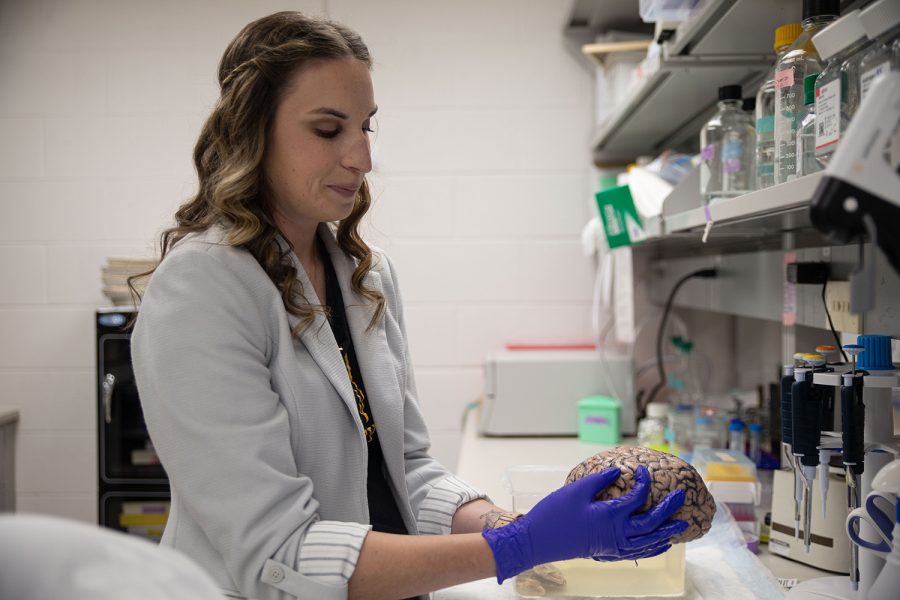Two UI doctorates to continue research following graduation
The researchers were recently awarded the Graduate Research Excellence Award in their fields and plan to continue researching the long-term mental health effects of COVID-19 and why Tau can cause different diseases, respectively.
Kimberly Fiock holds a brain at UI Medical Laboratories in Iowa City on Wednesday, May 3, 2023.
May 8, 2023
University of Iowa graduate students Kara Carter and Kimberly Fiock are reaching the end of their educational journeys on a high note: as Graduate Research Excellence Award winners.
Carter and Fiock won the award for their research and work in their respective fields.
According to the Office of the Vice President for Research, the Graduate Research Excellence Awards is awarded to students who conduct research that is unique and original while contributing to their field of work.
Carter’s education experience has been untraditional. She is a 2002 UI alum and graduated with a degree in social work. She then went straight into practicing social work for a nonprofit in Atlanta, Georgia.
Carter decided and move back to Iowa City to work as a medical social worker at the Iowa City Veteran Affairs Hospital for several years. A couple of years before beginning her doctorate program, Carter switched to working in end-of-life care, which she said is her real passion.
Carter worked in hospice care for a few years before deciding to return to school. This month, Carter will graduate with her doctorate in social work.
Most recently, Carter finished her dissertation study, which focused on the experiences of older adults who survived a COVID-19 hospitalization.
Carter said she wanted to understand the experience of the people who survived a COVID-19 hospitalization and show how important mental health services are post-hospital stay.
Carter said she was interested in knowing individuals’ experiences and conducted interviews with them to learn.
“What was happening in their life when they found out they had COVID? How did it escalate to hospitalization? What happened while they were in the hospital? And then, what was that transition at discharge?” she said.
Carter took the information she got from individual cases, looked for recurring themes and experiences, and cross-analyzed them to reveal her main findings. She found through her interviews how seriously older adults took their COVID-19 diagnoses and how great their health care was.
“… The participants all talked about their health care providers being exceptionally attentive, that they didn’t feel isolated, they didn’t feel like a leper, they didn’t feel like someone that folks were avoiding,” Carter said. “So, really went on and on about the quality of care and the attentiveness of the healthcare staff that walked the journey with them.”
Carter said she also found that many of the people she interviewed still experienced long COVID-19 symptoms.
“At the time that I had interviewed them, it was like a year and a half — almost two years out — from the hospitalization, still having to use home oxygen with activity, still having shortness of breath, still having a lot of cognitive brain fog, still feeling that incredible fatigue. And then new problems, or new or worsening problems,” she said.
Post-graduation, Carter will pursue writing and will work to publish more of her dissertation findings and look for funding to continue her research on post-ICU syndrome and long COVID-19. Carter will also teach at the UI.
Fiock, the second recipient of the Graduate Research Excellence Award, will graduate with her doctorate in biomedical science with a concentration in experimental pathology.
Fiock graduated with her bachelor’s degree from the University of Texas at Dallas with a double major in neuroscience and psychology. She said she was drawn more to the disease side of neuroscience, and she came to the UI in 2018 to start her master’s degree.
RELATED: UI researchers identify long COVID-19 with chest X-rays
When it came to her research, Fiock focused on a microtubule-stabilizing protein called tau. Tau is a protein that is important throughout people’s lifespans and is found in neurons in the central nervous system.
“Tau can attach or detach from the microtubules, and that changes the cell’s ability to change shape and move … so this is a normal process that happens in all of us, and it happens starting in development all the way until we’re adults,” Fiock said. “But somewhere along the line, when we’re adults, something about this process goes wrong, so tau can be modified.”
People can develop neurodegenerative diseases like Alzheimer’s due to too many additions to the tau. When there are too many additions, problems can arise.
“The cell can add stuff to tau, which changes its function … The more additions to tau, the more changes. And so, if you have too many additions of something, tau can’t bind or does not bind anymore to the microtubules, it pops off and makes things less stable,” Fiock said.
During her research, Fiock said she wanted to explore why the same protein causes different diseases and how the same protein causes different symptoms.
Fiock said tau is the protein associated with Alzheimer’s disease, which only affects one cell type and has one set of symptoms, while frontotemporal lobar degeneration-tau is a group of diseases, like dementia, that affect different regions of the brain and affect different cell types.
After graduation, Fiock plans to work as a staff scientist in her lab to continue her research.















